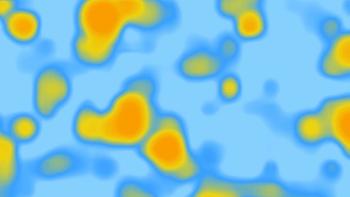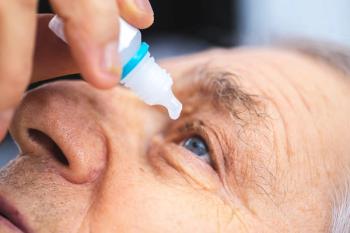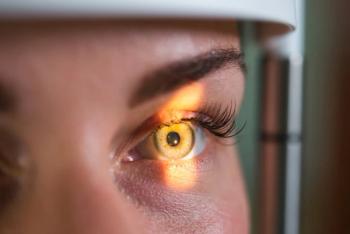
Vision Expo East 2024: Getting your patients excited about contact lenses
Scott Moscow, OD, talks his practice's contact lens "test-driving" option and how to get patients on board with trying out new corrective eyewear.
Scott Moscow, OD, details the importance of eye care providers getting their patients excited about the prospect of contact lens candidacy in an interview with Optometry Times at Vision Expo East.
Video transcript
Editor's note - This transcript has been edited for clarity.
Scott Moscow, OD:
Hey, I'm Dr Scott Moscow from Roswell Eye Clinic. I'm the clinical director of a 6 doctor private practice. Here at Vision Expo having an awesome time seeing all the new fashion, all the new technology, having a great, great time seeing what's coming down the pipeline everywhere.
Specifically talking about contact lenses, in our practice, we're always trying to proactively bring up contact lenses to the patient. Many patients come in and may want contact lenses, but they're not going to proactively reach out to say, "Am I a candidate for contact lenses?" and unfortunately, a lot of doctors pigeonhole patients into being a glasses-only patient or a contact lens-only patient. So if they're booked for a contact lens exam, we of course bring up contact lenses to them. What about that patient that is booked for glasses-only exam? They fall into one of many categories, either A: they don't know they're a candidate for contact lenses, B: they're told that they weren't a candidate in the past for contact lenses, so why would they ask about contact lenses? C: they dropped out of contact lenses. And there's some other categories as well, but generally speaking, that's where those patients fall.
In our office, we educate every single patient that is a candidate for contact lenses that they are a candidate for contact lenses. And to take money off the table, we give them a free contact lens test drive, it's called a contact lens demo. We tell them it's absolutely free to test drive. You can go to our optical and checkout our glasses or just walk around, go drive your car, whatever it may be. We'll take your contact lenses off before you leave. Absolutely free to test drive just like test driving a car. If you end up going with contact lenses, we do charge a contact lens evaluation fee. If not, again, it's absolutely free. Our conversion rate, about 65% of those patients coming in (and remember the inclusion criteria on this are patients that did not want contact lenses did not want to contact lens evaluation) 65% of those patients end up going with a contact lens evaluation that day. We don't know how many patients come back later on, or maybe next year after we introduced them to contact lenses to come in for contact lenses. So that's how we get a lot more patients into contact lenses in our practice to improve their lifestyle.
Now a lot of other patients have dropped out of contact lenses. We love to offer them a contact lens demo too. Listen, we know that the technology 10, 20 years ago wasn't there for you, especially those patients over 40 years old. We have so much technology now, we have so much more technology coming out, especially for those patients. So we love reintroducing patients that used to love contact lenses, or maybe were in a gas permeable lens, a custom lens, that now can be in a more mass produced lens that may be more comfortable for them.
There's a new Contact Lens Institute research that suggests that 1 out of every 2 glasses-only patients are highly interested in contact lenses. Are 50% of your glasses-only patients bringing up contact lenses to you? Probably not. You need to proactively introduce the idea of contact lenses to those patients. You as the doctor have to probe, have your staff probe, and find out if they would be willing to, at least in our practice, do a contact lens demo, or in your practice, at least if you don't do demos, let the patient know they are a candidate for contact lenses and be excited. "Hey patient, why are you not wearing contact lenses?" "I was told I wasn't a candidate before." "Well guess what? You are a candidate now. We have new technology now that has come out that allows you to be a candidate when you weren't before."
We're always trying to introduce new technology to our existing contact lens wearers and we all know the contact lens wears normalize their wearing experience. There's 3 ways that we evaluate contact lenses as patients and doctors: how's vision, how's comfort, and what is the health of the contact lens? The patient evaluates the vision, the patient evaluates the comfort. The doctor is normally the 1 evaluating the health. Is there a corneal neovascularization going on? Is there a healthier lens with more oxygen transmissibility that we can get? So we like to ask our patients, "How's the vision? How's the comfort?" Obviously, if there's a vision problem or a comfort problem, then we can introduce a new technology to hopefully fix that problem. But even if vision and comfort are perfect, in the patient's mind, "perfect" in the patient's mind, we can still introduce a healthier lens modality and really help speak to a lot more patients than we realize. They will want to be in the healthiest lens modality.
If you take nothing else away from this conversation, proactively bring up new technology to your existing "happy" patients and introduce contact lenses to patients that are not in contact lenses right now, for whatever reason. Make sure to get out and go to conferences. There's nothing more valuable than interacting with fellow optometrist and other folks in the industry.
Newsletter
Want more insights like this? Subscribe to Optometry Times and get clinical pearls and practice tips delivered straight to your inbox.








































